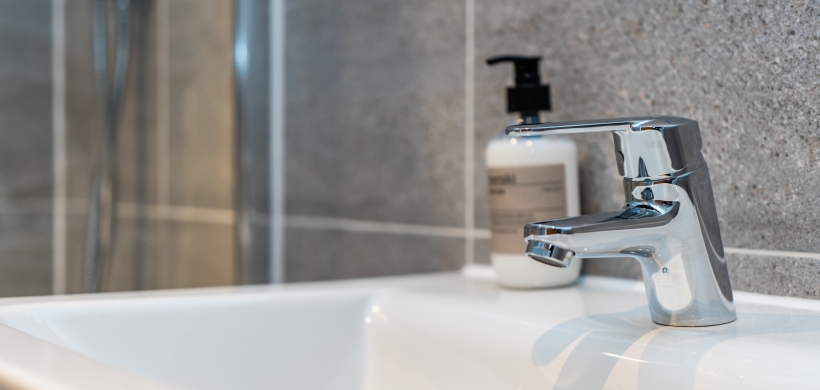Why is saving water important?
We use water every day. Not just for drinking, but for cleaning ourselves and our homes, for growing the food we need to survive, and for producing the clothes that we wear.
Although our planet is covered in water, 97.5% of this water is locked in seas and oceans, too salty for human use. And most of the remaining 2.5% is in the ice caps. This means that we depend on a tiny amount of fresh water, in rivers, lakes and reservoirs, to produce everything that we need to survive.
Climate change is putting more pressure on this already small amount of fresh water. Even in England, where we get a lot of rain, the UK Environment Agency predicts that people will face shortages by 2050, unless we start saving water fast.

Will saving water save me money?
If you have a water meter, then all of these tips could save you money on your water bill.
Even if you do not have a meter, using water wisely and cutting down on the amount of hot water you use will lower your gas and electricity bills.
Here are our 10 top tips to save water at home:
1. Save water in the shower.
On average, a shower uses 10 litres of water every minute. So taking a 10 minute shower uses 100 litres of water. If a family of four each cut their shower time by just one minute, they could save as much as 11,648 litres of water a year - potentially saving them £45 on metered water bills and £52 on energy bills.
You can also fit a low flow shower head, which will make your showers more efficient, allowing you to use less water for every minute.
For free water saving products, like low flow showerheads, visit the Save Water Save Money website and enter your postcode to find your water supplier.
2. Save water when flushing your toilet.
Cistern displacement devices are bags which you put into the cistern of your toilet to reduce the amount of water used when you flush the toilet. By using one of these, you could save between one and two litres of water every time you flush.
For free water saving products, like cistern displacement devices, visit the Save Water Save Money website and enter your postcode to find your water supplier.
You may not be able to open the cistern of your toilet if you have a sealed or built in toilet unit. If this is the case, you won't be able to use a cistern displacement device.
You can also reduce the amount of water you use when you flush by using the lower flush option, if you have a dual flush toilet.
3. Reduce your food waste.
Crop production uses a massive amount of water. By planning your meals, only buying what you need, and not throwing away any food, you will reduce your food waste, and reduce water waste too. Find out more about food waste in our Slow Cook, Low Waste recipe booklet.
Farming animals for meat and dairy and harvesting crops like avocados at a large scale uses a lot of water. By eating less meat and dairy and more seasonal and local vegetables you will be helping to conserve water. For more information on how you can make sustainable food choices, visit our green cooking advice page.
4. Reuse water.
Rinse fruit, vegetables and dishes over a bowl in your sink to collect the water and then reuse this to water your plants.
In the summer, you can reuse the water from your paddling pool to water your garden.
5. Get a water butt.
Water butts collect rainwater, saving it for when you need to water your plants. Just fill your watering can from your water butt and save around 900 litres an hour, compared to if you were using a garden hose or sprinkler system.
You should only use a watering can with your water butt, never a sprinkler or hose. Water butts can contain Legionella bacteria which can spread if inhaled. Using a watering can minimises air-borne water droplets, preventing the spread of Legionella bacteria. You can prevent Legionella in your water butt by cleaning it annually and insulating it to keep the water cool, preventing the growth of bacteria.
You can also save water in your garden by watering your plants in the evening instead of the morning, checking the weather forecast before you water (it might rain tomorrow!) and not watering your lawn.
For more gardening tips, visit our Gardening page.
6. Run your dishwasher when it is full.
The average dishwasher uses 10 litres of water each cycle. If you have a dishwasher, you can reduce your water use, energy bill and carbon footprint by only running the dishwasher when it is full. If you use your dishwasher in this way, you will save more water than washing your dishes by hand.
7. Wait until you have a full load of laundry before using your washing machine.
A washing machine uses about 50 litres of water per cycle. By waiting until you have enough clothes to fill the machine before starting the cycle, you will make the most of this water, and prevent waste.
The same rule applies to your dishwasher - wait until it's full before you turn it on.
For more tips on how to wash your clothes and clean your home sustainably, visit our green cleaning advice page.
8. Steam your vegetables.
Steaming your vegetables saves water and is healthier than boiling.
If you do boil your veg, you can use the leftover water to make soups and stocks, or let it cool and water your plants with it.
For more sustainable cooking tips, visit our green cooking advice page.
9. Wash your car with bucket of water.
Washing your car with a bucket and sponge is the most water efficient way to do it.
Save Water Save Money have a useful step by step guide to saving water when washing your car at home and at the car wash.
10. Keep a jug of water in the fridge to avoid running the tap until it is cold enough to drink.
This one is simple - and a great hack for hot summer days!
For more information view our video below.
You may be following all of these tips already and are still struggling to pay your water bill. There is no shame in reaching out for support with your bills if you need it. Your water company may be able to help you if you are struggling to pay. To find out how your water provider can support you, visit their website:

